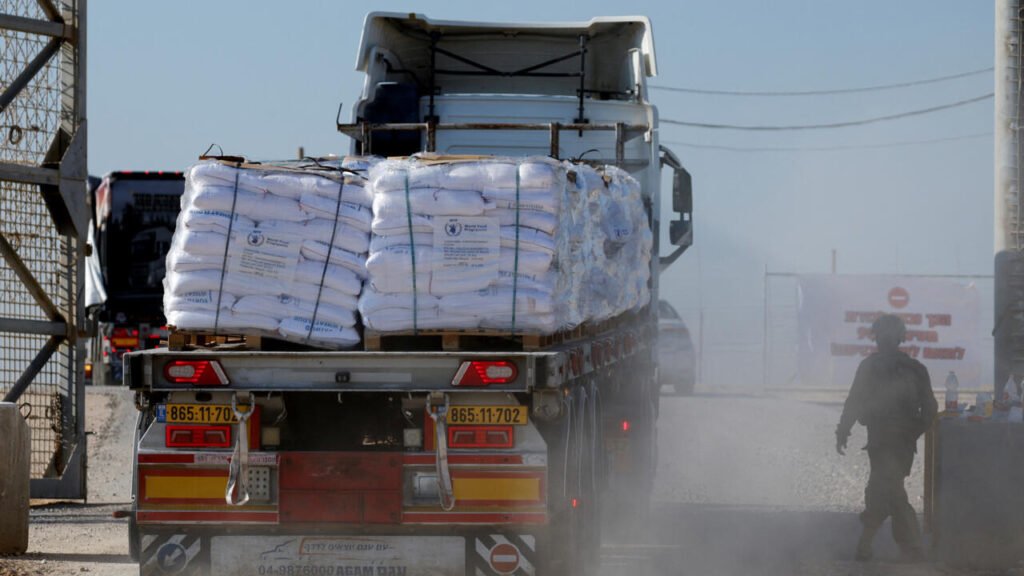GAZA, Jerusalem – Israel said Sunday it would halt military operations for 10 hours a day in parts of Gaza and allow new aid corridors into the devastated territory, where images of starving Palestinians have alarmed the world.
Military activities are scheduled to cease from 10:00 a.m. to 8:00 p.m. (07:00-17:00 GMT) until further notice in Al Mawasi, a designated humanitarian area along the coast, in central Deir al-Balah, and in Gaza City to the north.
The Israeli military said safe routes would be set for food and medicine convoys between 6 a.m. and 11 p.m., starting Sunday.
Tom Fletcher, a UN humanitarian official, said staff will intensify their efforts to feed the hungry during the pauses in the designated areas.
“Our teams on the ground… will do everything they can to reach as many hungry people as possible during this period,” he said in a post on the X website.
Dozens of Gazans have died due to malnutrition in recent weeks, according to the Ministry of Health in the Hamas-run enclave. The ministry added that 127 people, including 85 children, have died from malnutrition since the start of the war.

Emirati aid
25 Emirati trucks entered Gaza via the Rafah crossing, carrying a number of pipes for pumping drinking water.
By installing water pumping pipes, the UAE aims to establish a new water pipeline that will provide potable water to southern Gaza. This new project, which could provide water to approximately 600,000 people in southern Gaza, extends 7 kilometers from the desalination plant in Rafah, Egypt, to the displacement area between Khan Yunis and Rafah.
For its part, the Egyptian Red Crescent Society said it sent more than 100 trucks loaded with over 1,200 tons of food aid to the southern Gaza Strip via the Kerem Shalom crossing on Sunday.
Hours earlier, Israel began airdropping aid, in what it said was an attempt to alleviate the humanitarian situation in the Gaza Strip.
Aid groups said last week that there was mass hunger among Gaza’s 2.2 million residents, and international concern over the humanitarian situation in Gaza has grown, prompting French President Emmanuel Macron to decide to recognize a Palestinian state in September.
The United Nations said last week that humanitarian pauses in military activity would allow for “increased humanitarian aid,” adding that Israel had not provided sufficient road alternatives for its convoys, hindering aid deliveries.
Israel, which cut off aid flows to Gaza in early March and reopened them with new restrictions in May, says it is committed to allowing aid in but must control it to prevent it from reaching militants.

Hope and uncertainty
Many Gazans expressed initial relief at Sunday’s announcement, but said the fighting must end permanently.
Others expressed concerns about how aid would be delivered and whether it would reach people safely.
Israel’s far-right National Security Minister Itamar Ben-Gvir criticized the aid decision, which he said was made on Saturday without the input of Israeli Prime Minister Benjamin Netanyahu and defense officials.
“This is a surrender to Hamas’s deceptive campaign,” Netanyahu said in a statement, reiterating his call to cut off all aid to Gaza, seize control of the entire Strip, and encourage its Palestinian residents to leave.
A spokesman for Netanyahu did not immediately respond to a question about Ben-Gvir’s comments.
After allowing aid into Gaza in May, Israel claimed there was enough food in Gaza, but the UN failed to distribute it. The UN asserted that it was operating as efficiently as possible under Israeli restrictions.
The war began on October 7, 2023, when Hamas fighters stormed southern Israel, killing some 1,200 people, most of them civilians, and capturing 251 hostages and taking them to Gaza.
Since then, the Israeli offensive has killed some 60,000 people in Gaza, most of them civilians, according to Gaza health officials, destroyed much of the territory, and displaced nearly the entire population.









